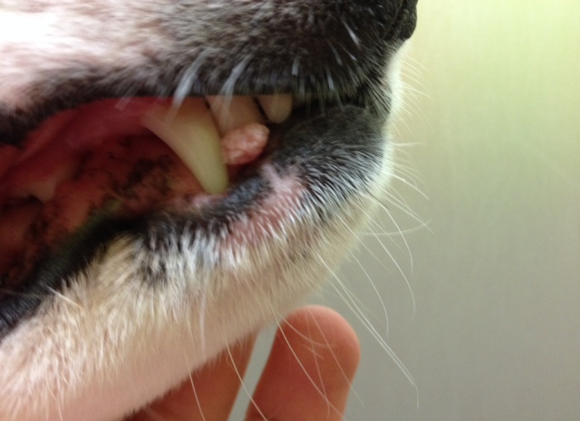What are Papilloma Warts in Dogs?
What is Papilloma?
Papillomas are benign clusters of abnormal cells caused by the papilloma viruses, which creates cauliflower-like skin and mouth lesions in dogs. These viruses tend to affect young puppies (typically under 2 years of age) who get outbreaks of oral papillomatosis, immuno-suppressed dogs, and older dogs who grow warts as they age.
Since all canine papilloma viruses are opportunistic as all dogs are assumed to have been exposed to this virus, only dogs with weaker immune systems would likely have a flare up. However, canine warts do not affect humans, cats or other species, so you don't have to worry about catching anything from your dog.
Papillomatosis in Puppies
Young puppies often contract papillomatosis or oral papilloma where the lips, gums, roof of the mouth, inside cheeks and very rarely around the eyes will develop cauliflower-like fleshy wart clusters. It is usually spread by direct contact with dogs with saliva is exchanged through licking, playing, and greeting. The virus can also be spread through sharing of drinking water, insect bites, cuts, and scrapes. However, the most common ways of transmission is through oral contact.
Photo above shows a puppy with a papillomatosis on his bottom lip.
This virus usually affects puppies that are under two years of age typically because their immune systems are still fairly immature compared to adult dogs so they have not built up an effective immune response to eliminate the virus. It will typically take puppies anywhere between 2 weeks to several months to get its immune system in gear to resolve a case of oral papilloma.
If your puppy has contracted oral papilloma, please refrain from any contact with other dogs (e.g., refrain from dog parks, doggy daycare, meet and greets on walks, and doggy socials) until all the warts have resolved on its own. If you choose to have the warts physically removed via surgery, it doesn't remove the virus from your dog's body. Therefore it is always best to have the warts fall off on its own to ensure your puppy's immune system has done its job at fighting against the virus.
For dogs who are suffering from immunodeficiency and have developed large amounts of oral warts where it becomes difficult to eat or drink and quality of life is compromised, please seek veterinarian assistance to obtain suitable antibiotics for your puppy.
How do I treat Papillomatosis?
The best way to prevent papillomatosis is to ensure your dog has a strong immune system by keeping them healthy with a good diet and lifestyle. It's important to also strengthen their digestive system with a good amount of probiotics as well as digestive enzymes to help them breakdown and absorb the foods they eat better.
It has been implicated by many veterinarians that vaccines may be a cause of papillomatosis, so it's important not to over-vaccinate our pets. Often warts are an indication the animal has received too many vaccines, or has had a negative reaction to vaccines.
A very useful homeopathic treatment for warts is called Thuja occidentalis, derived from the northern white cedar, Arbor vitae, which means "Tree of Life." Thuja is the primary vaccinosis (adverse reaction to a vaccination) remedy for cats and dogs but also helpful for symptoms of disorders that affect the skin, including warts, rashes, eruptions, cysts, and tumors. Please consult with your holistic veterinarian prior to using Thuja in treating of your dog's papillomatosis.
In order to reduce your pet's chances of contracting papillomatosis, it's important to reduce the number of unnecessary vaccines your pet receives. This will also help to maintain a healthy and strong system for your pet!
Learn more about optimizing your pet's wellness below:
Resources:
www.vet.bc.ca/oral-papillomas.pml
http://www.pethealthnetwork.com/dog-health/dog-diseases-conditions-a-z/oral-papilloma-virus-dogs




